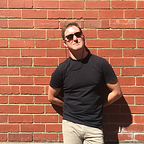The Road to Normal
When I began working as a guide in Melbourne there were words and phrases I found myself repeating that infuriated me. ‘Eatery’ was definitely one, and ‘artisanal’ of course, but ‘coffee culture’ was my least favourite. If I felt one of my guests was really on the level, I’d ditch my feigned enthusiasm and give them the scoop: “We’re big on coffee. It’s very good here but there are a lot of artisanal mother fuckers that talk about ‘coffee culture.’ It’s not actually a culture, it’s a drink.” Call me a bogan, but that sentence is way more Melbourne than ‘coffee culture’ — it’s self-deprecating, irreverent and the coffee brag is a humble one. It’s the delicate balance of having some depth and quality but not being a wanker about it — essential for a Melburnian to master.
It’s fun being a guide, you’re responsible for guests’ impressions of the place and they’re often a blank canvas. There’s a favourable imbalance of power and the facts aren’t important except in lending stories credibility. Most people aren’t curious about facts. People want to know what life is like here, how it’s different from their own and why. With five million people living here, 40% of whom were born outside of the country, life is like a lot of things. There you go, a few facts for credibility. Still, I’d make sweeping statements like “Melburnian’s love supporting local…” because it’s sometimes true and it fits nicely with the impression I’m trying to give. American’s love a story like that… except there are more than three hundred million Americans so they love a lot of different things. Tourism is not an industry I’d recommend for people who can’t get around a vague generalization.
It was always interesting getting a local on tour. It made me a bit nervous so I’d say something disarming like “My guests don’t usually know anything about Melbourne so forgive me if I start making things up”. Then I’d show them a few cool spots and proceed to tell them why they are the way they are because most of us don’t know …or that we are a particular way; self-deprecating, irreverent… In relation to what? If we aren’t reminded regularly, by travelling, or travellers, or worlds vastly different from our own, it’s easy to forget how we are because it’s just the way. Too much familiarity can be strangely disorienting — something you might experience in a long lockdown or an insular community.
I went to see a skin specialist once who I remember being quite eccentric. In the initial consult, he asked me, “If someone saw you walking on the beach, would they say ‘there goes a particularly moly person’?”. Firstly, weird, right? Secondly, I didn’t quite appreciate it then, but he wasn’t asking if I have a lot of moles. Who knows what I think is the normal amount? I tend to think I’m pretty normal. I like to think of abnormal as being measured in how different you are to me. Asking how I think others perceive me is a different question. We need external reference points to locate our position.
In Australia, we’ve had more than a year now with closed borders; with no travellers and no travelling. Isolation is not foreign to us, well into the 20th century we were still months by sea from most of the world and for those who made the journey, it was often traumatic and usually just once. I tell people it’s why we have so many ethnic community areas, why we planted oaks trees and why we’re so warm and hospitable — in it together here alone at the end of the earth. It’s not exactly relatable in a world where you can jump on a Dreamliner, pop a couple of temazepam and wake up in LA but there’s a muscle memory to it.
Historical fiction is a favourite of mine. In particular, I love novels about the Age of Discovery and the Industrial Period. It’s in this time that a sense of ‘the other’ went from imaginary to commonplace — suddenly, you could buy Chinese tea, grown in Ceylon in a shop in London or meet an intrepid American in Guangzhou. Things become normal so quickly it’s easy to forget they once were rare or didn’t exist. It’s what I find so interesting about history, remembering why we are the way we are, because it is so easy to forget.
Today, normal is ordering groceries to be delivered instead of leaving the house; we even bought a nice home coffee machine. The coffee culture here is on-point. It’s become the way so quickly I just wanted to reflect on how weird it is so I don’t forget.
Originally published at https://danielplatt.substack.com. Click to read more or subscribe.
